Feb 19, 2025 – Day 3 of the 100-Day Dharma Talk, Weekly Dharma Assembly, The Peace Foundation Research Seminar
Hello. Today is the third day of Venerable Pomnyun Sunim’s 100-Day Dharma Talk. Throughout the day, religious gatherings, a Weekly Dharma Assembly, and events for The Peace Foundation were held at the Jungto Social and Cultural Center.

After completing his morning practice and meditation, Sunim headed to the Jungto Social and Cultural Center at 7 AM. Pastors, priests, bishops, and religious leaders arrived one by one at the basement dining hall to attend a meeting of religious leaders for national reconciliation and peace.
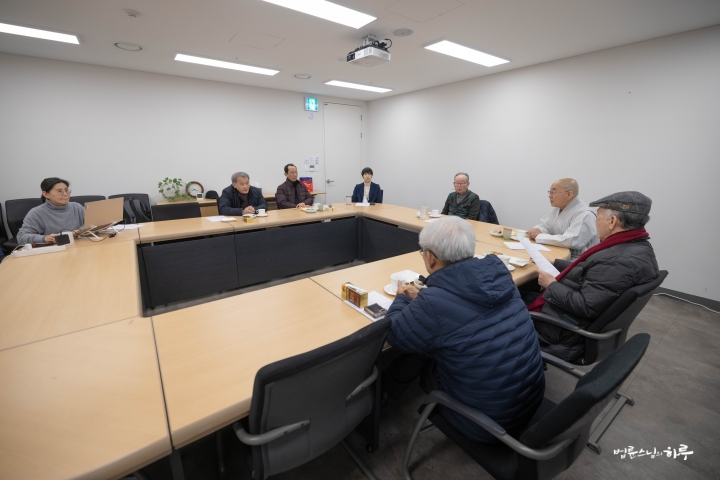
After having breakfast prepared with care by The Peace Foundation staff, they moved to the foundation’s meeting room for discussions. First, Park Nam-soo, the chairperson of the religious leaders’ meeting, gave opening remarks.
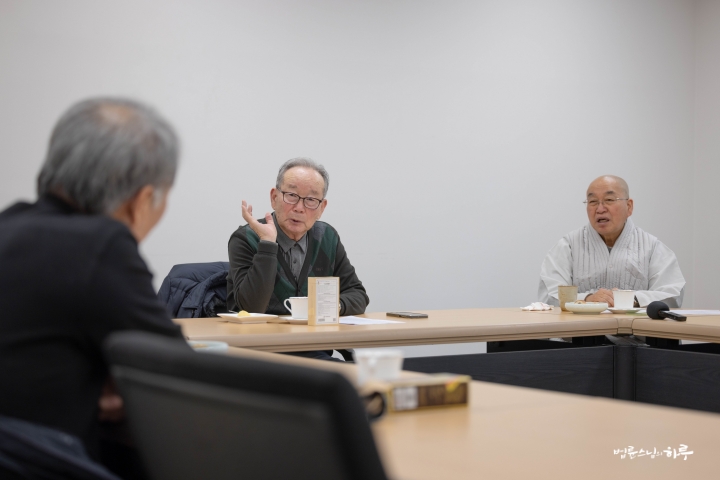
“Today is our first meeting since the start of the Year of Eulsa. This year holds several significant meanings. It’s been 120 years since the Eulsa Treaty of 1905 when we lost our country, 80 years since the liberation in 1945, and 77 years since the establishment of the Republic of Korea government in 1948. Looking at the historical significance, this year seems truly important. As this is the first meeting of such a meaningful year, I hope Sunim will suggest an agenda fitting for this occasion.”
Sunim then proposed topics for discussion. First, they shared and discussed the details of how to participate in the religious section conference of the International Reconciliation Conference to be held in July.
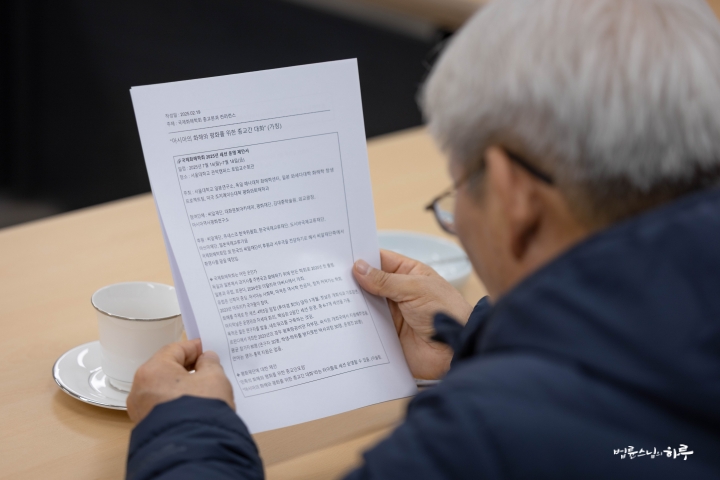
The theme of the conference is “Interfaith Dialogue for Reconciliation and Peace in Asia.” Sunim talked about what the religious leaders’ meeting has been doing for the past 20 years and mentioned that there is a similar group in Sri Lanka.
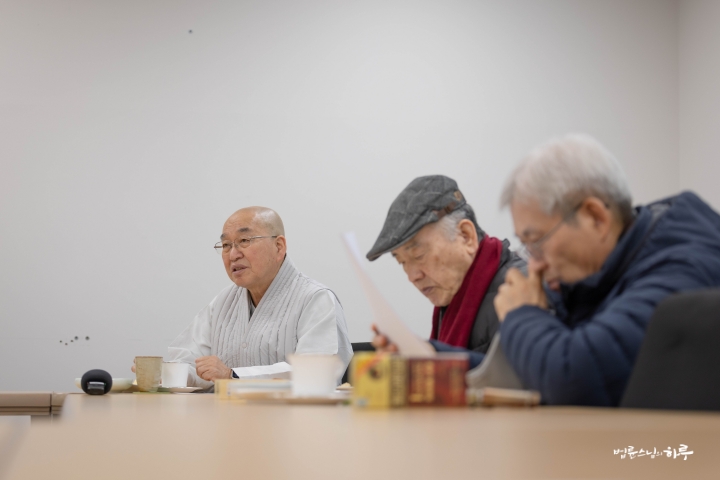
“For reconciliation between South and North Korea, it’s important not only for religious leaders from both sides to meet but also for different religions within South Korea to engage in dialogue. That’s why we’ve been holding these religious leaders’ meetings for the past 20 years. The Peace Foundation’s religious leaders’ meeting has been doing three main things. First, religious leaders cooperate to initiate dialogue between South and North Korea and lead reconciliation efforts. In the past, religious leaders in Korea often fueled conflicts between the two Koreas. Instead of instigating conflict and creating confrontational structures, religious leaders should lead reconciliation efforts. So, we’ve been leading not only inter-Korean exchanges but also various interfaith exchange activities. Second, religious leaders from different faiths have been providing humanitarian aid to North Korea through dialogue. Third, we’ve been playing a role in reconciling conflicts between progressives and conservatives for national integration. We’ve continued these religious leaders’ meetings with the intention of transforming the atmosphere of mutual hostility into one of reconciliation and cooperation.
When I visited Sri Lanka in 2023, I found a group there doing similar activities to ours. Even in extreme civil war situations, leaders from various religions including Islam, Hinduism, Catholicism, and Buddhism were operating a dialogue group for national integration in Sri Lanka. I thought we could learn a lot from hearing about the role they played. So, I think it would be good to invite them to the International Reconciliation Conference for a dialogue session.”
He then proposed the main agenda for today’s discussion.
How Can We Reduce Social Unrest, Even If Only a Little?
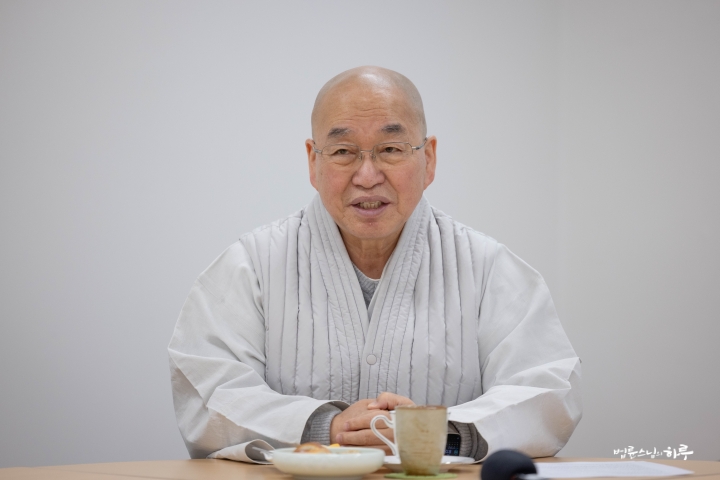
“There are two topics I’d like to discuss today. First, how can we peacefully resolve the current impeachment situation? If the Constitutional Court doesn’t uphold the impeachment, the country will fall into great chaos. Conversely, if the impeachment is upheld, although less severe than if it’s not, there will still be strong opposition from conservative forces. In the subsequent presidential election, if the progressives win, the conservatives will continue to raise issues, and if the progressives lose, there will still be chaos. Even if a party secures a majority in the National Assembly, if they lose the presidential election, the nation will be divided, and conflicts will grow, just as when President Yoon Suk Yeol was elected. So, I think the best solution would be for President Yoon Suk Yeol to voluntarily step down. Rather than maintaining his current stance of indifference to state affairs, it would be better if he played a role in quelling social unrest by voluntarily resigning. This might even be considered as a mitigating factor in his trial. If he truly cares for the nation and its people, President Yoon should make at least this level of decision. Of course, some might say that if he were capable of such a decision, he wouldn’t have made the self-defeating move of considering martial law in the first place. However, to minimize social unrest even a little, it’s necessary to persuade President Yoon.
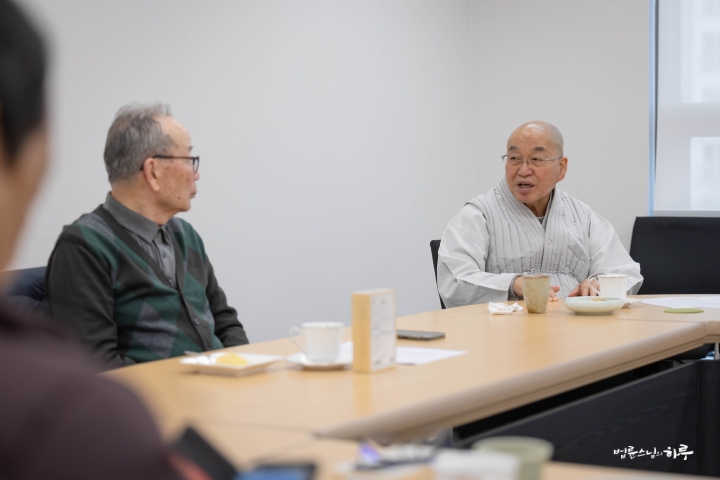
Second, regarding the upcoming presidential election, the question is what role religious groups should play to help the country regain stability. The current imperial presidential system will continue to cause problems regardless of who becomes president. It is necessary to transfer some of the president’s powers to the prime minister and cabinet, decentralize the central government’s authority to local governments, and revise the winner-takes-all election law. However, since there is little time until the next presidential election, even if we cannot revise everything at once, we must quickly achieve a constitutional amendment to disperse the president’s powers at the very least. Therefore, I think it would be good to hold a national referendum for constitutional amendment simultaneously with the presidential election. The newly elected president should immediately launch the 7th Republic, moving in a direction that eases political strife regardless of who wins or loses after the election, which will make the country less tumultuous.
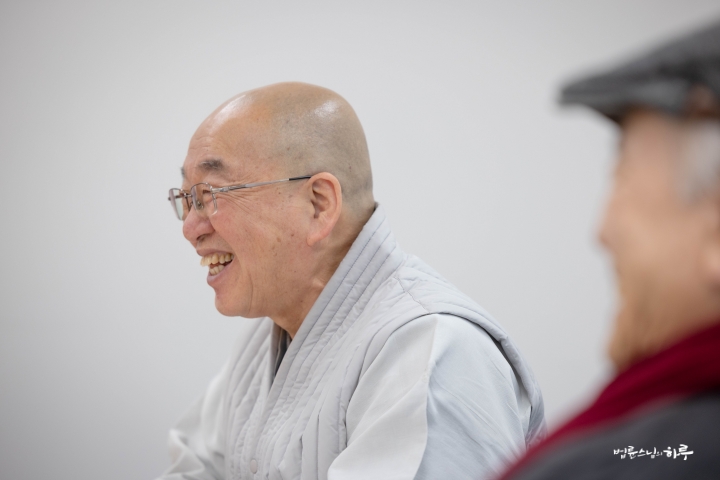
I’m curious about what you all think about this. Should we act quietly behind the scenes to persuade, or would it be better for social elders to gather and issue a statement and act publicly? I’d like us to discuss together what method would be best.”
The pastors, priests, bishops, religious leaders, and ministers all freely expressed their opinions.
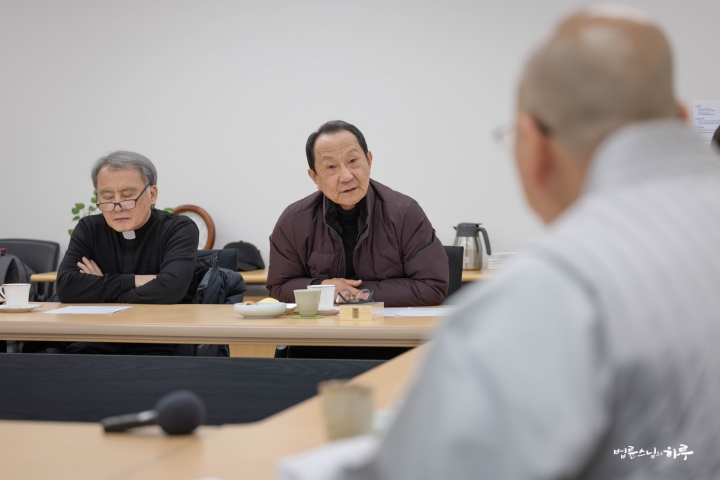
All the religious leaders pointed out the limitations of the imperial presidential system and agreed on the need for constitutional amendment, but they said there were more points to consider regarding the implementation method. As the Constitutional Court had not yet ruled on whether to uphold the president’s impeachment, they decided to watch the situation a bit longer and concluded the discussion.
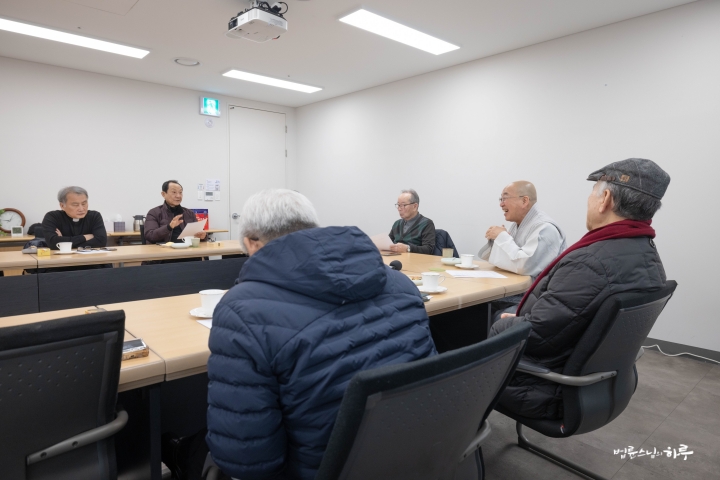
After seeing off the religious leaders, Sunim headed to the third-floor Dharma hall. In the Dharma hall, after an hour of morning prayer from 9 AM, they were briefly tidying up the space.
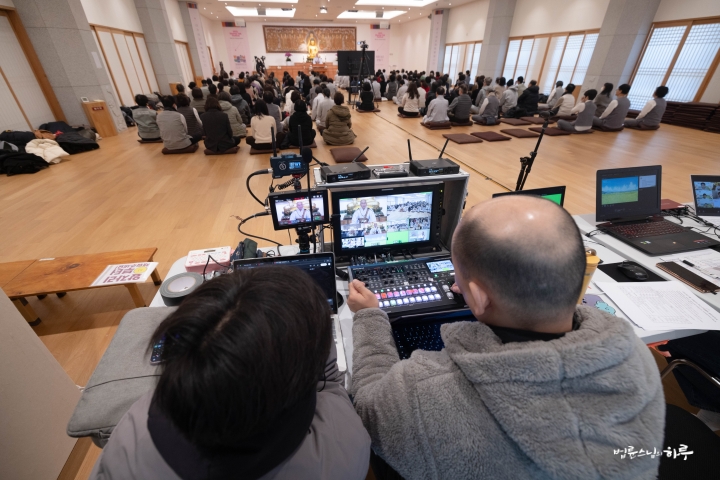
With about 250 people in attendance, at 10:15 AM, the Weekly Dharma Assembly began with the recitation of the Three Refuges and the Heart Sutra. Jungto Society members also joined online through a video conference room. The attendees requested a Dharma talk from Sunim with three full bows.
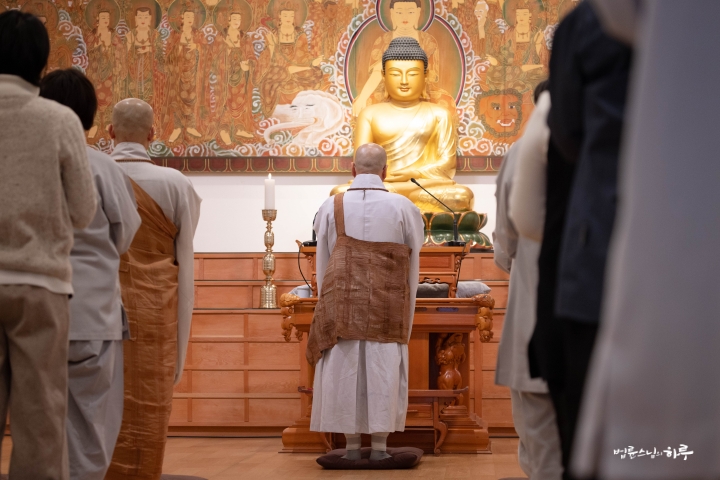
Sunim began his Dharma talk by mentioning the signs of the worsening climate crisis and the rapidly changing international society following President Trump’s re-election. He emphasized why it is important to convey the Buddha’s teachings in such turbulent times.
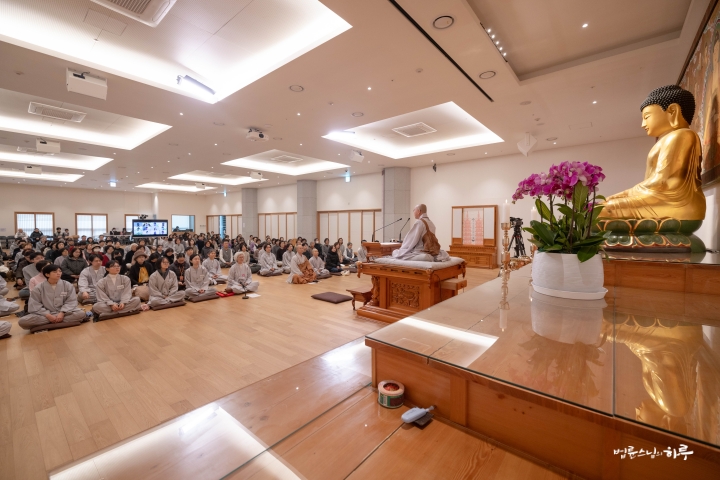
“The suffering and difficulties you are experiencing now do not all stem from material problems. However, you are seeking solutions to your suffering entirely in material things. You think that if you had more money or a bigger house, your problems would be solved.
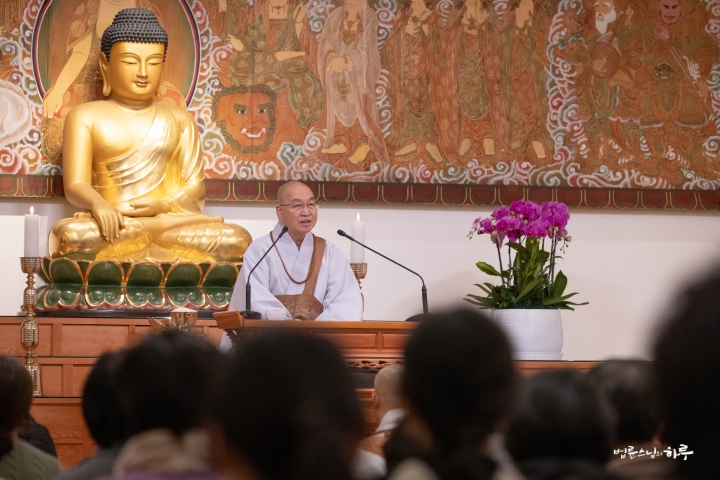
How to Free Yourself from Ignorance and Addiction
If someone is truly suffering from poverty, material support can be a solution. For those who are malnourished due to lack of food, providing food is the answer. This is a problem that can be solved through material assistance. However, if someone is overweight and their health is at risk due to overeating, material support cannot solve the issue. Obesity can only be resolved through self-control of one’s desires. But if a person is addicted to taste, they cannot stop. This is why combating obesity is much more difficult than eradicating malnutrition. It’s generally more challenging to address excess than to resolve deficiency.
To free oneself from ignorance and addiction, spiritual healing is necessary. However, until now, most religions have promoted a consumerist approach, suggesting that wishes will be granted if one prays. The method to free oneself from ignorance and addiction can be found in the teachings of the Buddha. Therefore, understanding the Buddha’s teachings and practicing diligently according to them is not limited to just religious significance. It is necessary not only for an individual’s free life but also for the sustainable life of humanity.
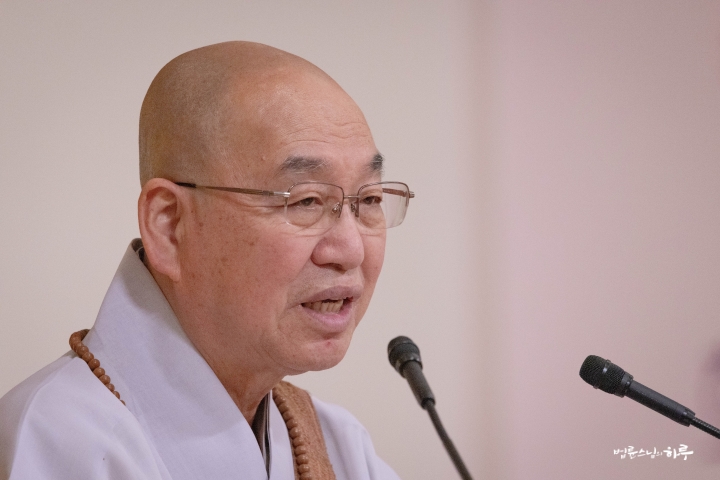
Jungto Society members have consistently practiced with this perspective. To focus more on spreading this good Dharma to neighbors in the new year, we have designated 2025 as a special practice period. For the first 100 days, we are conducting the 100-Day Dharma Talk to better understand the Buddha’s teachings. During these 100 days, it’s important to diligently practice on your own, but equally important to actively spread the Dharma. The registration deadline for the Jungto Dharma School is now only two weeks away. I hope all of you will actively spread the Dharma so that many people can participate in the Jungto Dharma School, which is the first step in learning the Buddha’s teachings.
Sunim then took questions from those who had submitted them in advance. Two people pressed the raise hand button online and asked Sunim questions. One of them sought Sunim’s advice on how to find peace after losing all their savings due to her husband’s cryptocurrency investments.
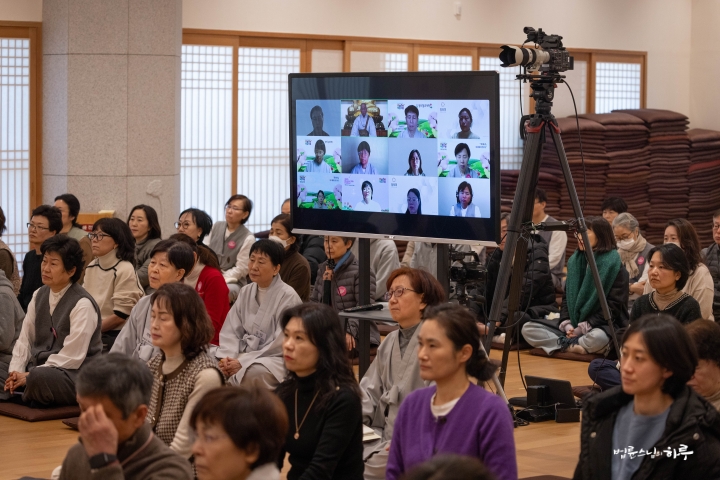
We Lost All Our Savings Due to My Husband’s Cryptocurrency Investments
“Is peace your ultimate goal?”
“I want both myself and my children to live well and be at peace.”
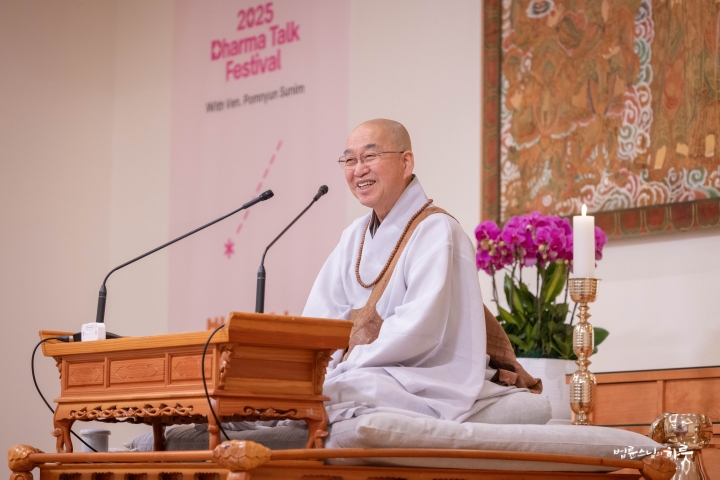
“Then you can just be at peace right now. Being at peace is not difficult. If your husband lost the wedding funds before marriage, you should have gotten the hint then. Even if the wedding date was set, you should have called off the marriage. But thinking, ‘How can I cancel the wedding when the date is already set!’ has led to this bigger problem now.
So what should you do now? First, although it’s late, you could decide it’s better to end it now and get a divorce. Second, since you’ve lived well together even after he made the first financial mistake without canceling the wedding, you could continue living together. You could live until your husband makes his next mistake and then decide to end it. Even if you end it then, it’s still good because you will have raised your children well until that point. Third, even if your husband makes another mistake, you could think, ‘If we’ve managed to live through this mistake, there’s no reason we can’t continue,’ and keep living together. If he makes another mistake after a quiet period, you could think, ‘We lived through one mistake, we lived through two mistakes, there’s no reason we can’t live through one more,’ and you might end up living together until the end of your lives.
For you to live peacefully, whether your husband makes mistakes or not is not the issue. If you had been starving since his first mistake, you might not have been at peace. But even after your husband’s first mistake, you paid rent and had and raised a child. Even after his second mistake, you’re not immediately out on the street living in a tent. Objectively speaking, it’s not a big problem. So there’s no need to think, ‘I’ll live with him if he doesn’t make mistakes!’ or ‘I won’t live with him if he makes mistakes!’ It’s not like your husband will make mistakes every day from now on. Now that he’s reflected on his actions, even if he makes a mistake, it probably won’t be for another 10 years. (Laughs)
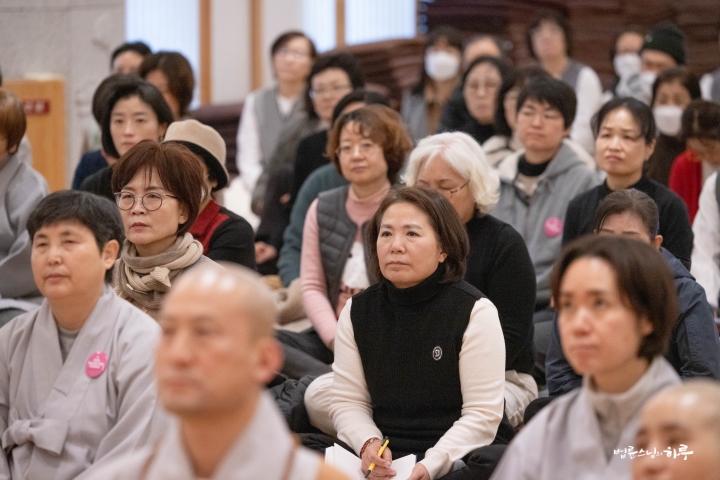
What would happen if you confront your husband about this incident? It’s likely that he would make mistakes more frequently. The intervals between his mistakes would become shorter. This is because the more you criticize him, the more he wants to prove his abilities to you by making a big score. As a result, he tends to make mistakes more quickly.
However, if you approach it by saying, “These things can happen in life. What do you plan to do next time?” without confronting him, he will feel less pressured and less inclined to immediately try to recover his losses. If you ask and he promises not to do it again, you can continue living together. But there’s no guarantee he won’t make mistakes in the future. As time passes, he may be tempted to think, “If I can just succeed this one time, I can overcome all our difficulties!” It’s not that he’s ignoring your words, but he might be tempted to prove his abilities to you by making a big score to compensate for past losses. This makes it likely that he’ll make mistakes again. He’s not lying now; his current intention to avoid mistakes is genuine. You should believe him. However, as time passes, he may gradually feel more tempted.
Since you have two children, it might be okay to continue living together. In old stories, it seems that a wife could run away with up to two children. With two children, she could carry one on each side and escape, but with three children, she couldn’t run away because of the third child. You have two children, so there’s still a possibility of leaving, but in my opinion, it might be okay to continue living together.
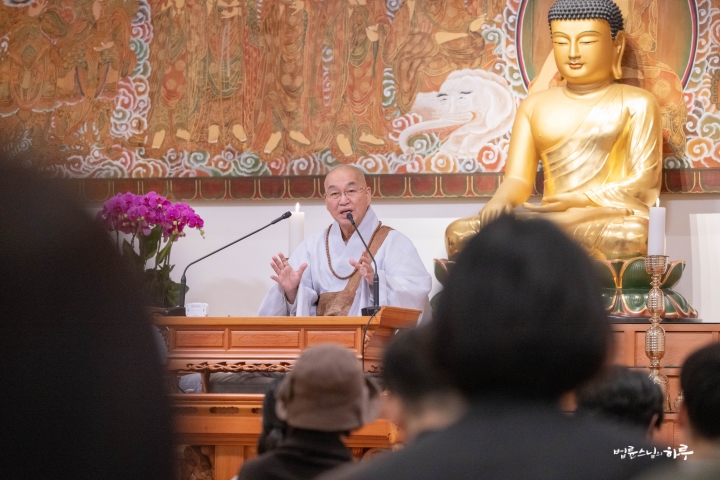
If you believe your husband’s promise to never make mistakes again and decide to stay together, you’ll end up saying, “He disappointed me again!” when he does make another mistake. Instead, it’s better to encourage him by saying, “You may have lost our assets through your mistakes, but at least we can still eat. Let’s work hard together,” and continue raising your children. Your husband has no assets now and can’t afford to pay child support. There’s little practical benefit in divorcing at this point. If you divorce, you’ll have to take sole responsibility for two children. It’s better to stay together. There’s no real reason to leave your husband. It’s better to have him at home to help with the children. For now, gently persuade him to stay together. When you’ve saved enough money that half of it would be sufficient to live on without your husband, then you can consider divorce. I understand your resentment towards your husband, but right now, there’s no practical benefit for you in divorcing. What do you think?
“You’re right.”
“Do you have any hidden assets?”
“No, I don’t.”
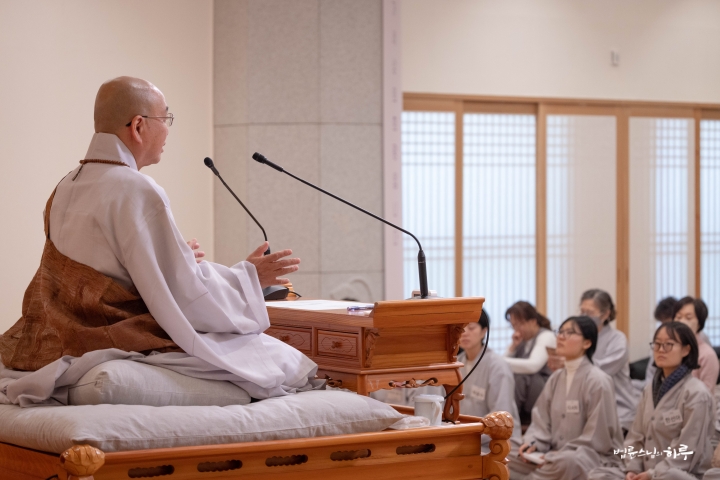
“Then what’s the point of divorcing? It’s more beneficial to have your husband help with the children and share your bed at night. If you divorce now, who will look after the children? You’re still young, how will you deal with the loneliness you’ll feel every night? I’m not suggesting you stay together because you can trust your husband or because you like him. Although he has disappointed you greatly, from a practical standpoint, divorcing isn’t a beneficial choice right now. It’s better to continue living together for a while and decide later when you can assess if there’s any practical benefit. In today’s world, thinking ‘I’m already married, so I shouldn’t divorce’ isn’t a realistic approach. I’m giving you very practical advice. What do you think?”
“You’re right.”
“It’s not about staying together because you can trust your husband, but because there’s little benefit in divorcing right now. It’s better for the children to have a father figure, too. Even if he just fulfills that role, it’s something to be grateful for. Right now, you should pat your husband on the back and encourage him. That way, he might go out and earn some money, even if it’s through manual labor or other jobs. For now, it’s better to gently persuade him to stay together rather than scolding him.”
“Yes, thank you.”
“When I have these conversations with you all, other monks ask me, ‘As a monk, shouldn’t you be talking about the Buddha’s teachings? Why are you only talking about worldly matters?’ But this is all part of the Buddha’s teachings. The Buddha’s teachings are not separate from our lives.
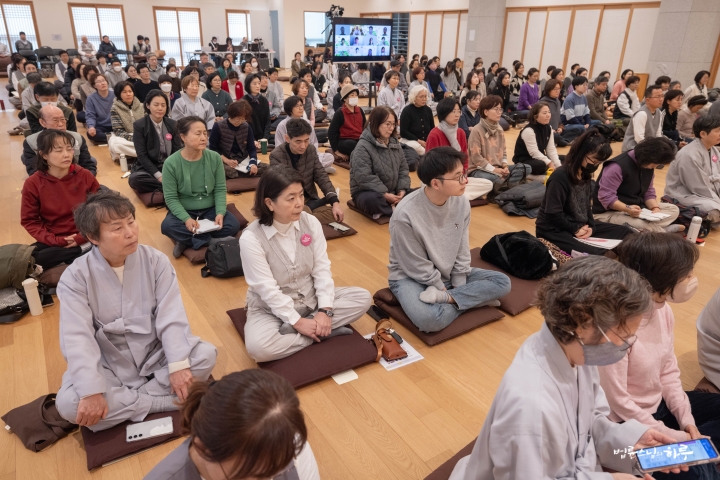
People tend to act foolishly when overwhelmed by their current emotions. That’s why the Buddha said:
‘You may be struck by the first arrow, but do not be struck by the second.’
People often continue to suffer second and third losses because they’re swayed by their emotions. If you’ve already incurred the first loss, a wise person prevents the second loss from occurring. In stock trading, this is called ‘cutting your losses.’ Let’s say you’re currently losing 1,000 won on a stock you bought. If you think you might lose 5,000 won if you hold onto it longer, it’s better to sell now and only lose 1,000 won. This is called cutting your losses. In life, you need to be good at cutting your losses. Don’t think that profit only comes from making money. Realizing that losing less is also a form of profit is important. However, most people can’t cut their losses. They dislike the idea of losing, so they keep trying until they break even. As a result, they end up losing 10,000 won instead of 1,000 won, or 100 million won instead of 10 million won. In gambling, if you lose some money and decide to go home, your loss is limited. But if you try to recover your losses by mortgaging your house for one more game, you might end up losing your house too.
Life never goes exactly as planned. There will be times of loss and times of profit, but if you’re too greedy for profit, you might end up losing instead. You should stop at a reasonable profit. When selling a house you’ve bought, you should stop at a reasonable profit and detach yourself from it. If you judge that further losses are likely, you should cut your losses and let go completely. It may seem like a loss in the short term, but in the long run, it turns out to be a profit.
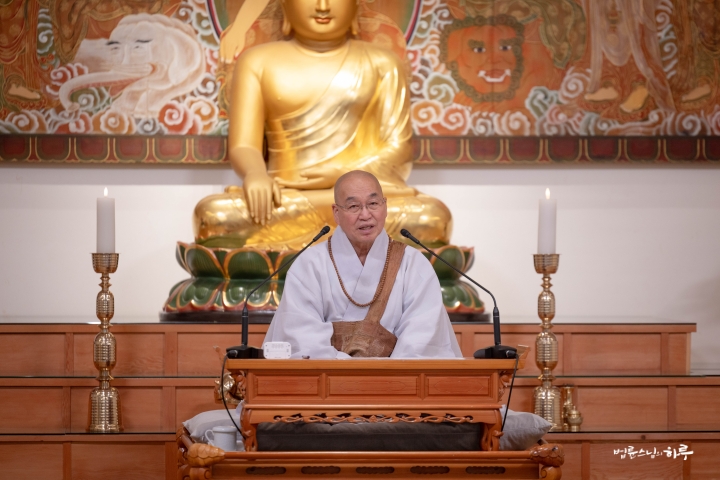
The same applies to relationships. If you see warning signs while dating, you should stop if you think it’s dangerous. However, people say they can’t cancel a wedding when the date is already set. So they get married, and then even if they want to divorce, children become an issue. Before marriage, the wedding date was the problem, and now children are the problem. As time goes on, something else will become an issue. So regretting later, thinking “I should have quit then!” is useless. You can’t undo what’s already happened. You could decide, “It’s no use continuing now, just like I couldn’t quit before marriage. It’s better to end it now!” However, from what I’ve heard, divorcing now when you’ve lost all your assets and have nothing left won’t benefit you. It’s better to continue living together, try to get some living expenses, and have your spouse do some housework. Live together a bit longer, then divorce later if needed, or continue if things improve.
There’s no set rule for how to live life. Practice means always having choices. Whether to use this choice now, save it for later, or never use it at all – it’s all your decision. In any case, you should be the decision-maker. If you think you divorced because your partner cheated, the decision-maker becomes your partner, not you. This is because you think you divorced due to your partner. This is not a perspective of practice. When something happens, you should decide how to handle it yourself. If you decide, there are no lingering feelings. Otherwise, a victim mentality remains. If you think, “If only that person hadn’t messed up, I would have bought a house and lived well by now!” you’ll continue to hold resentment. But if you decide whether to continue living with your husband or separate in this situation, you won’t talk about the past anymore. Do you want to live foolishly or wisely?
“I want to live wisely.”
“Then what should you do with your husband now? Should you scold him or gently persuade him?”
“I’ll try to live by gently persuading him and giving him roles.”
“Even if you divorce, you should do it when it’s sufficiently beneficial. For now, it’s better to live by gently persuading your husband, saying things like, ‘These things can happen in life. I’ll let it go this time, so please do better in the future.’ If you live together and it’s good, you can continue living together.”
“Yes, I understand.”
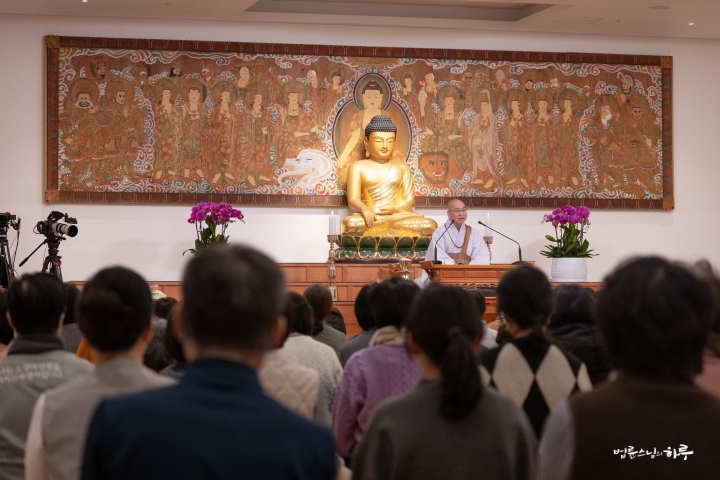
As the conversation ended, it was almost noon. The live broadcast concluded with a promise for next week’s Dharma assembly.
After lunch, from 1 PM, Sunim attended the Peace Foundation’s February public lecture held in the 9th floor auditorium on the theme “Preparing for the 7th Republic, A New Constitution.” Professor Lee Kuk-woon from Handong University gave the keynote speech titled “From Legalism to Responsible Politics.”
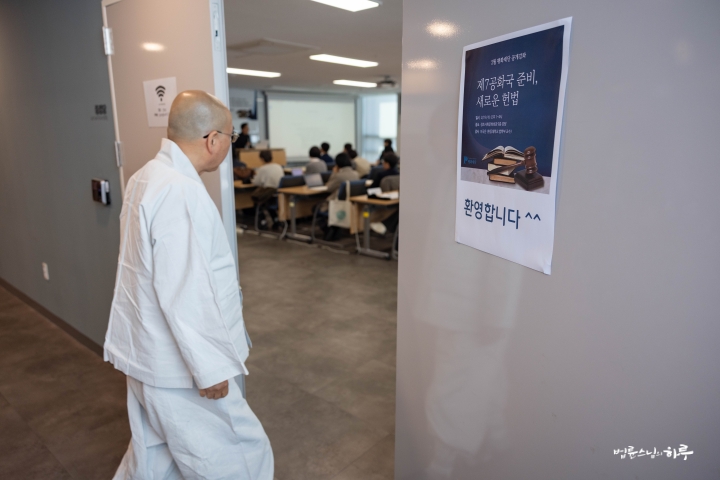
Professor Lee emphasized that Korean politics is deeply mired in “legalism,” a law-centered political behavior, which creates a structure that avoids political responsibility through law, hindering the development of democracy.
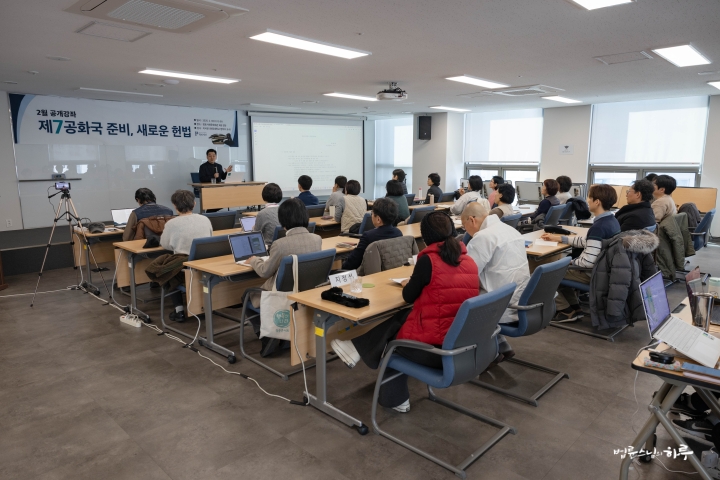
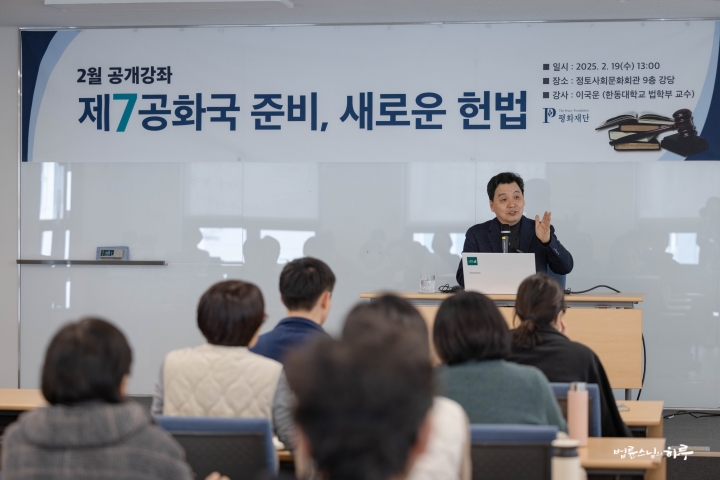
After listening attentively to the professor’s lecture, Sunim expressed his gratitude to the professor for his passionate lecture and exchanged greetings.
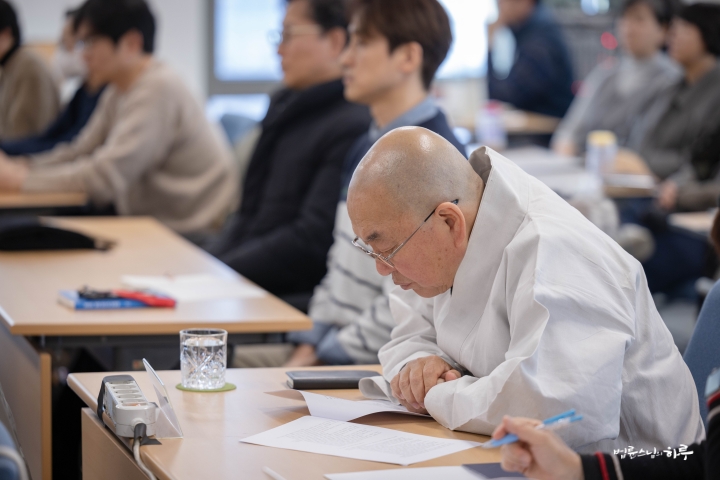
After taking a group photo, the Peace Foundation’s February public lecture concluded.

From 4 PM, Sunim attended the Peace Foundation’s Planning Committee meeting. For two hours, they discussed the current political situation in South Korea, changes in inter-Korean and North Korea-US relations after President Trump’s re-election, and the role of the Peace Foundation in this context.

As the meeting ended, the sun had set. Despite the cold weather with temperatures dropping below freezing, many citizens came to the Jungto Social and Cultural Center to listen to the 100-Day Dharma Talk.

At 7:30 PM, the evening session of the Dharma assembly live broadcast began in the 3rd floor Dharma hall. Sunim started his Dharma talk with about 350 people in attendance.
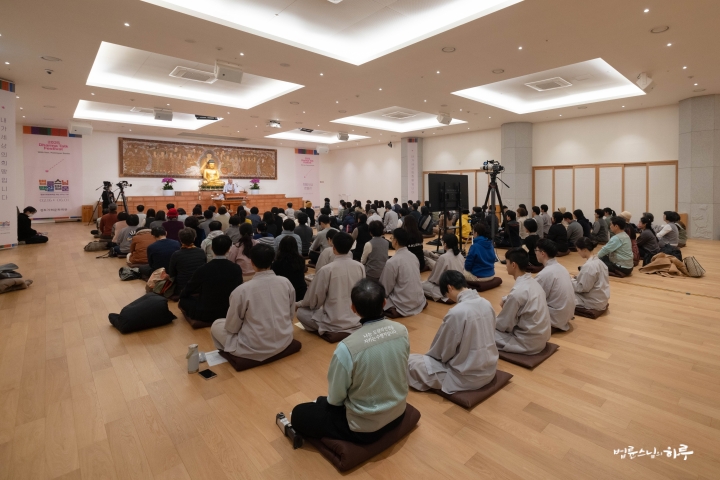
Like the morning assembly, he talked about how practitioners should maintain their center in the face of climate crisis and rapidly changing international society, and then took questions from the audience. Two people asked questions during the hour – one online and one in person. One of them had divorced and then dated a man 13 years younger, but recently broke up. She asked Sunim for advice on how to overcome the pain of separation.
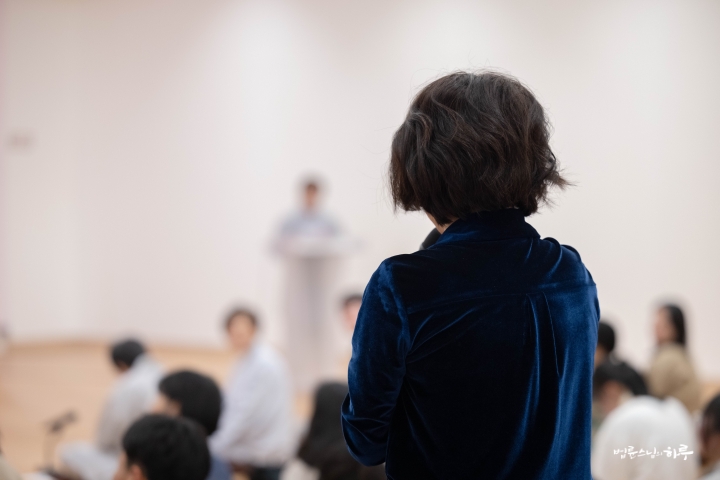
I’m in So Much Pain After Breaking Up with My Boyfriend 13 Years Younger
“If you enjoyed dating a younger man for two years, shouldn’t you accept the consequences to some extent? When there are good things, there are also bad things. Live in those memories for the next two years.”
“Do I have to endure the pain for two whole years?”
“You enjoyed a pleasant period for two years, so you should go through a painful period for two years as well.”
“How do I deal with memories that keep coming back at random times?”
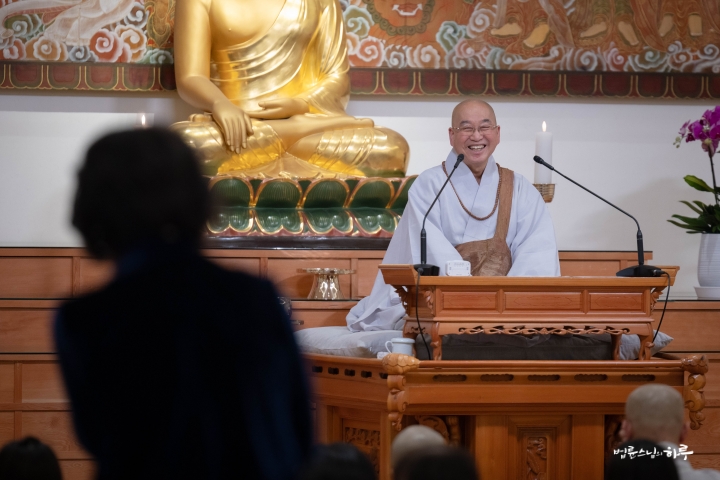
“Memories naturally come back at random times. If we could control our memories, wouldn’t everyone choose not to remember? Some people live with bad memories, so why can’t you live with good memories? These are all complaints of the well-fed. If something is good, consequences follow, and if something is bad, consequences follow. That’s the principle. How can you only have good things continuously? Think of it as ‘I had fun, so now I’m facing the consequences.’ It’s not a big deal. No one is beating you up, no one has stolen your property, no one has sexually harassed you, and no one has insulted you. If you miss him too much, you can go and meet him.”
“He’s currently going on blind dates to get married, so I don’t think I can go see him.”
“In a world where people even divorce married men to be with them, why does that matter? If you’re in too much pain, you could do that. What else can you do? You could go grab him by the collar and drag him back to live with you.”
“Emotionally, I want to do just that.”
“Why don’t you follow your emotions?”
“I feel like I shouldn’t do that, morally speaking.”
“It’s okay to do that.”
“It’s okay?”
“It’s not like you’re committing a crime.”
“I want to pray at least.”
“Why would you pray for something like this? If you miss him too much, you can call him. If you still miss him, you can meet him. If you really want to live together, you can plead with him while crying. If his parents keep asking for a child, you can adopt. If not, tell the man to go and have a child somewhere, and say ‘I’ll raise it.’ There are thousands, tens of thousands of ways.
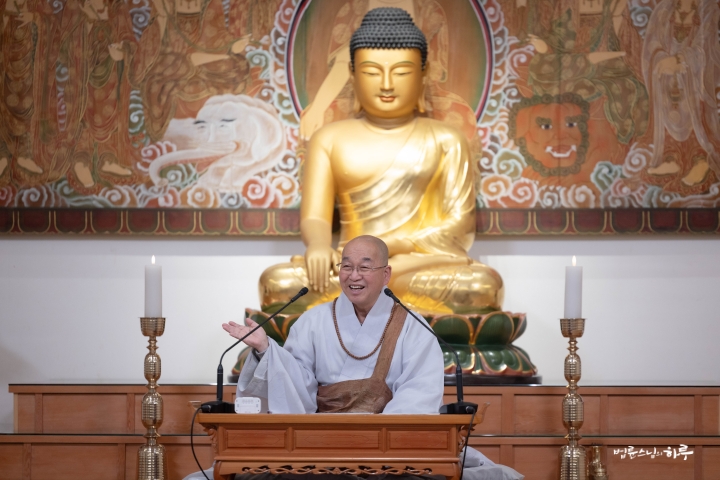
However, seeing that you’re paying this price after dating someone with such an age difference for two years, we can predict that if you lived together for five years and then broke up, you’d pay the price for five years. If you lived together for ten years and then broke up, you’d pay the price of that much pain. So, it’s your choice whether to have a little more fun and pay a bigger price, or to enjoy this much pleasure and pay only this much price. Is it better to borrow 100,000 won and pay back 100,000 won, or to borrow 1 million won because it’s fun and pay back 1 million won later, or to borrow 10 million won because it’s even more fun and pay back 10 million won later? That’s your choice. If you think, ‘I borrowed money and spent it, but it’s hard to pay back. I should stop at this point,’ then you can stop now. Trying one more time because you have lingering feelings is your choice.”
“I was happy for two years, so I’ll be in pain for two years. Thank you.”
“There’s no such thing as a free lunch in life. If you find money on the street, there will come a day when you lose money. If someone suddenly helps you for no reason and you think you’ve hit the jackpot, there will come a day when you suffer a loss for no reason. So even if you’re unfairly cursed by someone, don’t feel too wronged. As you live, there will also be times when you receive undeserved praise from someone. If you average it all out, everyone’s life score is the same. The average of Venerable Pomnyun’s life and your lives are all the same. You might think, ‘Venerable Pomnyun must have it good because he’s famous,’ but the famous Venerable Pomnyun can’t even eat a bowl of rice freely on the street. (Laughter)
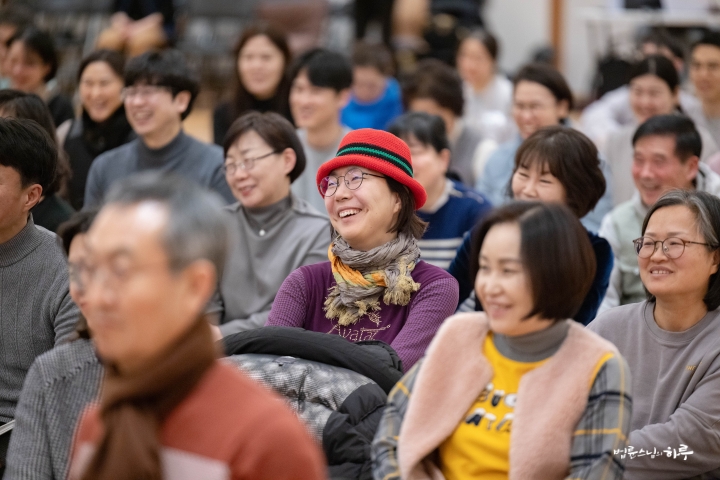
Do you want to wear nice clothes? However, wearing nice clothes can be inconvenient in many ways. If you spill juice on them, you’ll be preoccupied with cleaning it. Let’s say you’re out with your child, and they suddenly fall and spill juice. If you’re wearing nice clothes, would you worry more about what got on your clothes or whether your child is hurt? You’d likely be more concerned about what stained your clothes. What others have may seem better, but that’s not always the case. You’re not in a position like President Yoon Suk Yeol, so you don’t have to worry about being impeached or going to prison.
These days, there’s fierce competition in AI technology, and those involved are under a lot of stress. The people at the very top are fighting for first and second place, but below tenth place, there’s not much competition. Eleventh and twelfth places don’t compete much. However, first and second places compete intensely. When you consider both the advantages and disadvantages, there’s not much difference overall. In that sense, you’re all living in fairly good conditions without lacking much. That’s why I tell you to let go of both the idea that you’re superior and the idea that you’re inferior.
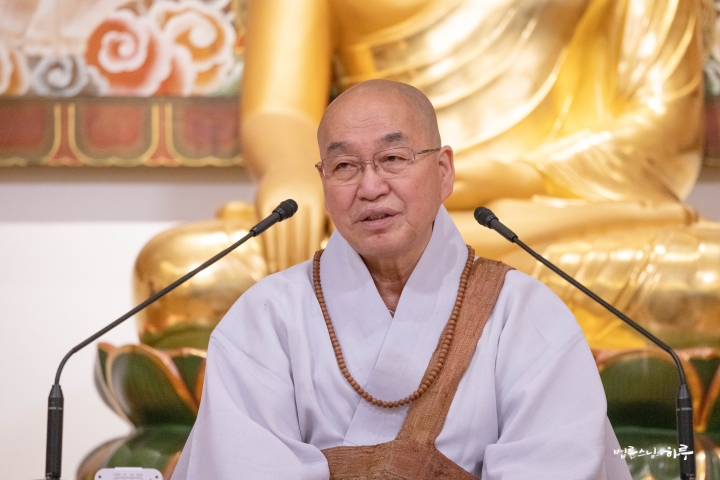
Do you think it’s appealing when a man dates two women or a woman dates two men? It might seem exciting from the outside, but that’s just a superficial view. Try it yourself and see if it’s really good. It’s hard enough to handle one person, let alone two.
When you look at life with a broader perspective, there’s not much difference. Consider the lifespan of mayflies: some die at noon, some at 4 PM, and a few might live until 10 PM. From the mayflies’ perspective, there’s a huge difference between those with short and long lifespans. But from a human’s point of view, what’s the difference? Whether they die at 4 PM or 10 PM, they’re all mayflies that die within a day.
You might envy or feel proud about living long or dying young, being rich or poor, having a partner or being single. If you look at these details too closely, there’s no end to it. Even if you consider a woman with a beautiful face, if you look at her pores under a microscope, you’ll see bacteria swarming like maggots. If you saw that clearly, you might not want to get close. It’s only because we can’t see these details that we perceive beauty.
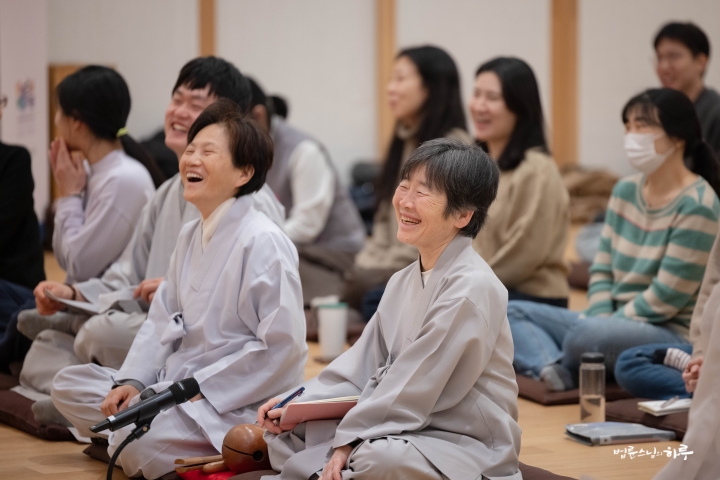
When you look at maggots in detail, they all have different weights, lengths, and numbers of wrinkles. Which one would be considered the most handsome maggot? From a distance, they all look similar, and a maggot is just a maggot. Similarly, when we look at people up close, everyone seems different, but from afar, people are just people. We talk about being old or young, but how much difference is there really? From a narrow perspective, there might be differences, but from a broader view, there’s not much difference at all. Up close and in detail, we see differences and distinctions. But from afar, everything looks the same. This is called ‘bulilbuli’ (不一不二) in Buddhism. It’s neither the same nor different. It’s both the same and different. It’s neither clean nor dirty. It can be called clean, and it can be called dirty. Here, saying “it’s neither clean nor dirty, neither the same nor different” is ’emptiness’ (空). Saying “it’s both clean and dirty, both big and small” is ‘form’ (色). That’s why we say “form is emptiness, and emptiness is form.”
If looking closely is difficult, you can step back and look from a distance. If looking from afar feels a bit empty, you can look closely again. It’s not that complicated. The point is not to overthink it.
When you form a connection, there will always be consequences. In a situation like this, you should realize, “Breaking up after a short relationship is painful. If I maintain happiness for a year, the pain will grow for a year. If I maintain happiness for two years, the pain will grow even more for two years.” If you don’t realize this and carry both pleasure and pain because of the pleasure, you are being foolish. A wise person would see the pain and let go of even the pleasure.
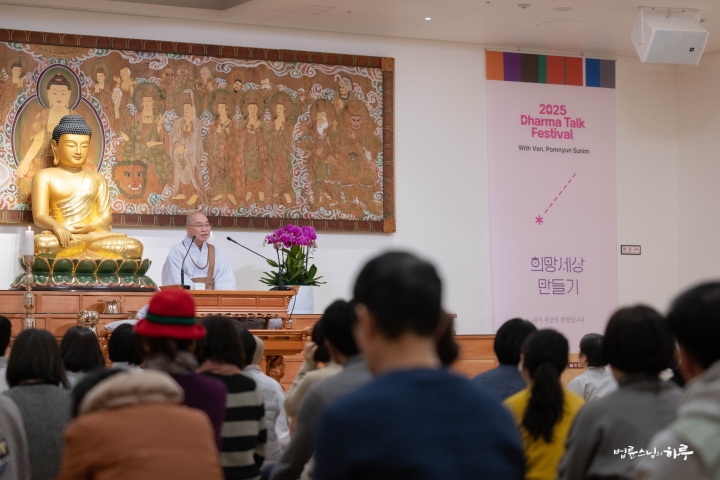
The entire audience gave a big round of applause to the person who had the courage to ask such an honest question.
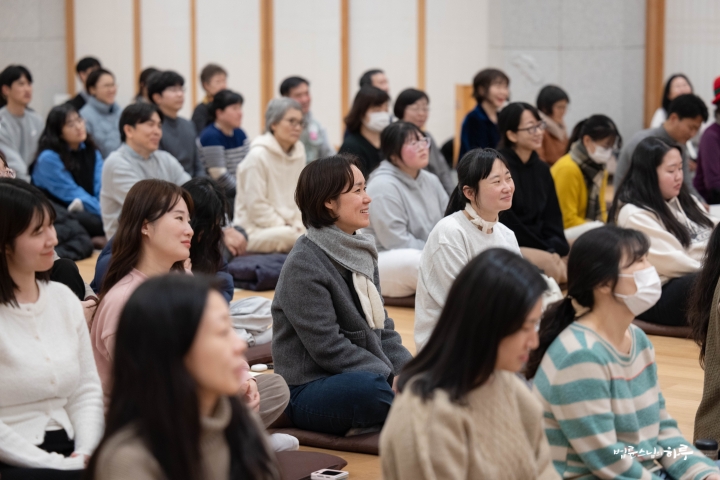
By the time the conversation ended, it was well past 9 PM. The members of the Sangha gathered in small groups, sitting in circles to share their thoughts and feelings. Sunim left the Dharma hall and headed towards the Jungto Center.
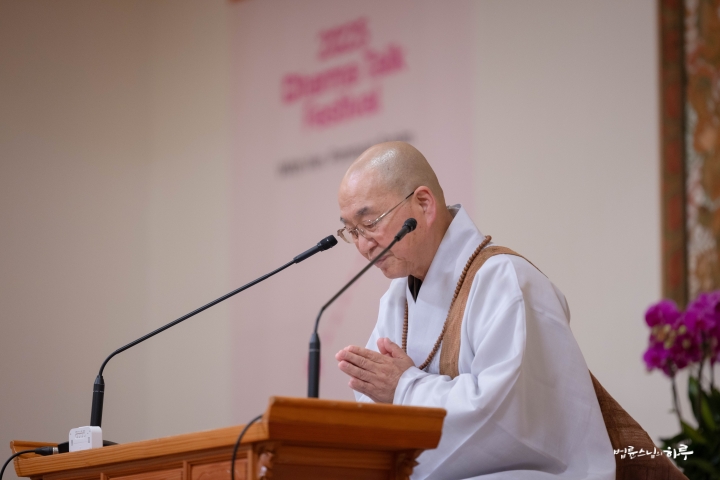
Tomorrow will be the fourth day of the 100-Day Dharma Talk. Sunim’s schedule includes an early morning breakfast meeting with North Korea experts at The Peace Foundation. In the morning and evening, he will give the third lecture of the Open Dharma Assembly on the topic of “Buddhist Chants.” In the afternoon, he plans to attend board meetings for JTS and Eco Buddha.





“It is generally more difficult to deal with excess than with deficiency.” This is a statement that I can very much relate to, based on my experience.